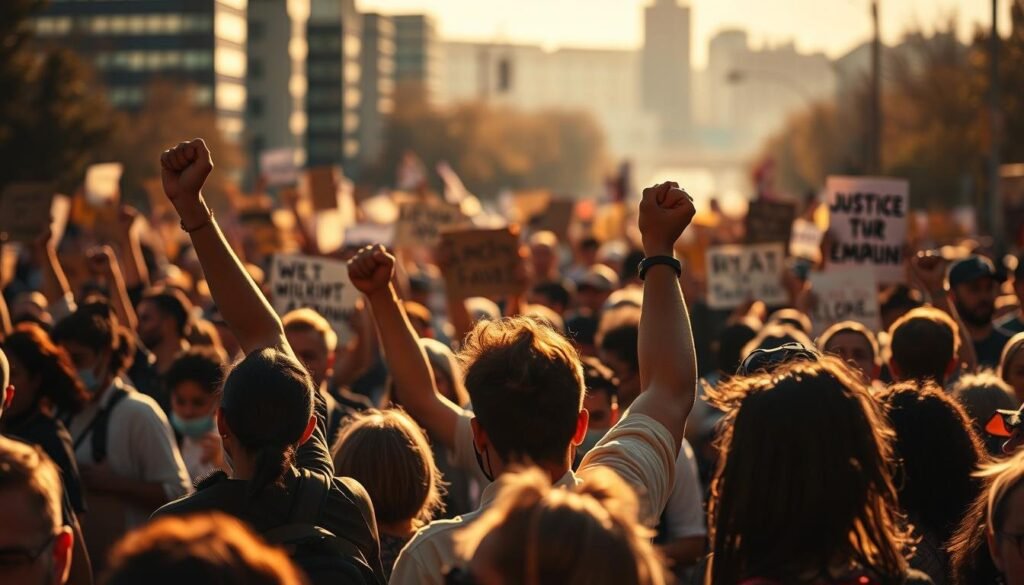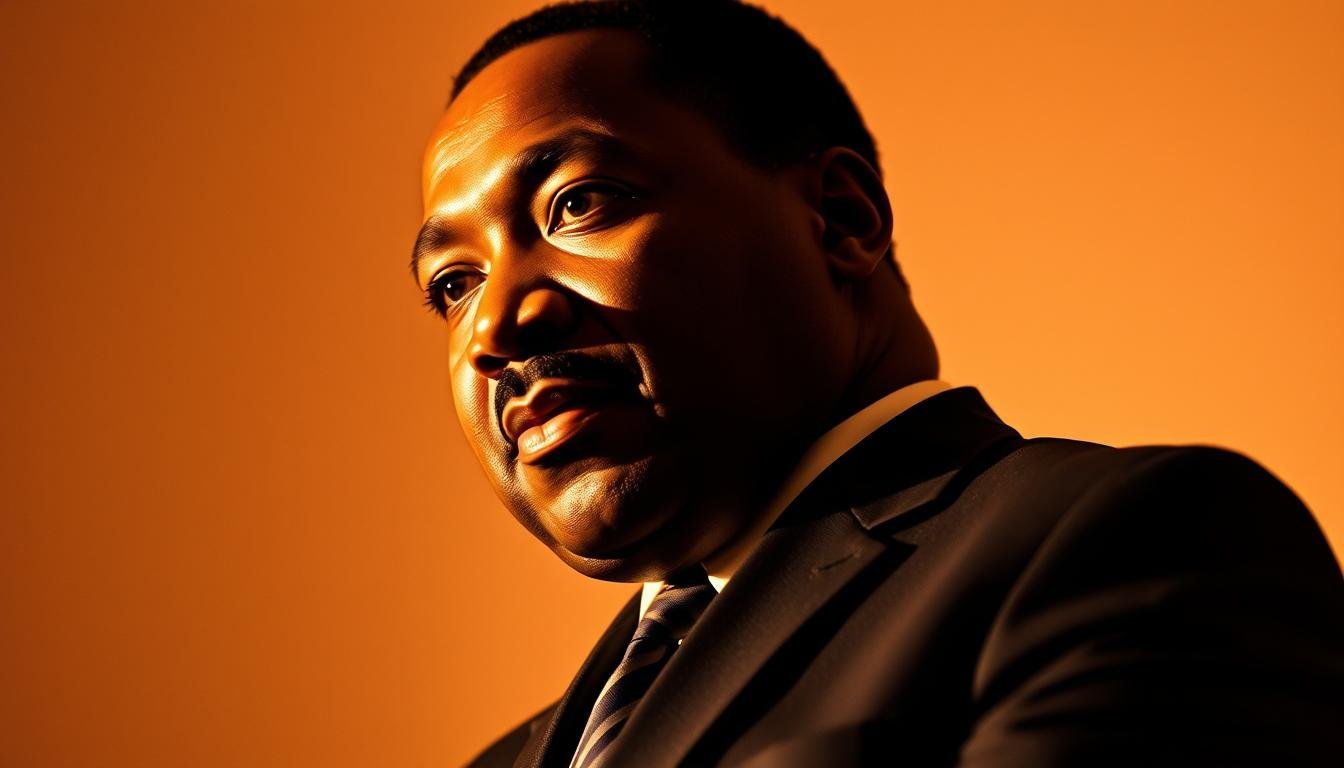Last updated on October 1st, 2025 at 07:56 am
Was Martin Luther King Jr. a Convicted Felon? You might have heard that Martin Luther King Jr. was involved in some controversial activities. As a key leader in the American civil rights movement, his actions were always watched closely. But was he a convicted felon? This question has sparked debate among historians and the public.
Exploring Martin Luther King Jr.’s life and legacy is crucial. It’s important to look into the facts about his legal history. This article will dive into the details of Martin Luther King Jr.’s biography, focusing on the events that led to the controversy over his status as a convicted felon. By understanding the context and circumstances, you’ll get a clearer picture of this complex aspect of his life.
Contents
- 1 The Life and Legacy of Martin Luther King Jr.
- 2 Was Martin Luther King Jr. a Convicted Felon? The Facts
- 3 MLK’s Most Significant Legal Troubles
- 4 Civil Disobedience as a Strategic Tool
- 5 Government Surveillance and Attempts to Discredit MLK
- 6 Understanding Martin Luther King Jr.’s Lasting Legacy
- 7 FAQ: Was Martin Luther King Jr. a Convicted Felon?
- 7.1 Was Martin Luther King Jr. ever arrested or convicted of a crime?
- 7.2 What were some of the significant legal troubles Martin Luther King Jr. faced?
- 7.3 How did Martin Luther King Jr.’s legal troubles impact his activism?
- 7.4 What was the FBI’s role in Martin Luther King Jr.’s legal troubles?
- 7.5 How did Martin Luther King Jr. use civil disobedience as a strategic tool?
- 7.6 What was the impact of government surveillance on Martin Luther King Jr.’s personal and professional life?
- 7.7 Was Martin Luther King Jr. a convicted felon due to his arrests and convictions?
The Life and Legacy of Martin Luther King Jr.
Martin Luther King Jr.’s life shows the strength of nonviolent resistance in bringing about change. As a key figure in the civil rights movement, his legacy still motivates efforts for equality and justice today. [Was Martin Luther King Jr. a Convicted Felon?]
King’s early years and education set the stage for his role in the civil rights movement. Born in Atlanta, Georgia, in 1929, he faced racial segregation early on. This shaped his determination to fight for change through peaceful means.
Major Contributions to the Civil Rights Movement
King made big impacts, like leading the Montgomery Bus Boycott and the March on Washington. His famous “I Have a Dream” speech was a highlight. These actions were crucial in changing public opinion and pushing for laws to change.
King showed the strength of nonviolent civil disobedience in achieving change. His dedication to nonviolence, even when faced with violence, earned him great respect.
Today, King’s legacy goes beyond his time, influencing current social justice movements. His life and work remind us of the power one person can have on society.
Was Martin Luther King Jr. a Convicted Felon? The Facts
Many wonder if Martin Luther King Jr. was a convicted felon. Let’s look at the facts. King was arrested many times for his civil rights work. These arrests came from peaceful protests against racial segregation and inequality. [Was Martin Luther King Jr. a Convicted Felon?]
King’s first arrest was in 1956 during the Montgomery Bus Boycott. He was arrested again in 1963 in Birmingham, Alabama, for leading a march without a permit. In 1964, he was jailed in St. Augustine, Florida, for joining a civil rights protest. These arrests led to convictions, with some fines and others short jail sentences.
- A conviction in 1956 for violating Alabama’s anti-boycott law during the Montgomery Bus Boycott.
- A conviction in 1963 for parading without a permit in Birmingham, Alabama.
- A conviction in 1964 for violating probation related to his 1963 arrest.
These convictions were mainly for his civil rights work. They were often overturned or had minimal sentences. Despite these, King’s legacy as a civil rights leader is untarnished. His actions are seen as key in the fight against racial inequality.
In conclusion, Martin Luther King Jr. was arrested and convicted many times. These legal troubles came from his activism and commitment to nonviolent civil disobedience. The circumstances of his arrests and convictions show the challenges faced by civil rights activists back then.
MLK’s Most Significant Legal Troubles
Martin Luther King Jr.’s fight for justice was filled with legal battles. These challenges tested his courage and the movement’s strength. As a key figure in the Civil Rights Movement, King faced many arrests and imprisonments.
Some of the most notable legal troubles include:
- The Montgomery Bus Boycott in 1955, which led to King being arrested and his home being bombed.
- The Birmingham Campaign in 1963, where King was arrested and wrote his famous “Letter from Birmingham Jail.”
- The Selma to Montgomery Marches in 1965, during which King faced legal challenges and continued to push for voting rights.
These events not only highlighted King’s personal sacrifices but also brought national attention to the civil rights cause.
Impact on His Activism
The legal troubles King faced had a profound impact on his activism. Despite the challenges, King continued to advocate for civil rights. He used his experiences to galvanize support for the movement. [Was Martin Luther King Jr. a Convicted Felon?]
The FBI surveillance, led by Director J. Edgar Hoover, aimed to discredit King. However, this surveillance often backfired, as it raised public awareness about the government’s efforts to suppress the civil rights movement.
King’s ability to navigate these legal challenges and maintain his commitment to nonviolent activism is a testament to his leadership. The legal troubles he faced became a crucial part of his story, illustrating the obstacles he overcame in the pursuit of equality and justice.
The impact of these legal troubles on King’s activism can be seen in several key areas:
- They strengthened his resolve and commitment to the cause.
- They provided opportunities for King to articulate his message through writings, such as the “Letter from Birmingham Jail.”
- They highlighted the brutality and injustice faced by civil rights activists, garnering sympathy and support from the public.
In conclusion, Martin Luther King Jr.’s legal troubles were a significant aspect of his activism, testing his resolve and amplifying his message. Through his leadership, King turned these challenges into opportunities, advancing the civil rights movement and leaving a lasting legacy.
Civil Disobedience as a Strategic Tool
Martin Luther King Jr. made civil disobedience a key part of the civil rights movement. He and his followers used nonviolent resistance to draw attention to the injustices faced by African Americans. This strategy won sympathy and support from many people.
King and his followers broke unjust laws, like segregation laws, and accepted the consequences. This approach was pivotal in highlighting the moral urgency of the civil rights cause. Events like the Montgomery Bus Boycott and the March on Washington showed the power of nonviolent resistance.

The civil rights movement’s use of civil disobedience led to big legal and social changes. It also inspired movements around the world. King’s nonviolent methods showed that change could be made without violence.
In conclusion, civil disobedience was crucial to the civil rights movement’s success. Through nonviolent resistance, King and his followers challenged unjust laws and brought about significant social change.
Government Surveillance and Attempts to Discredit MLK
The government’s actions against Martin Luther King Jr. are a dark part of American history. King, a key figure in the civil rights movement, faced constant surveillance. The FBI, led by Director J. Edgar Hoover, played a big role in these efforts.
Many don’t know how far the FBI went. They wiretapped, bugged, and watched King’s life closely. Their goal was to find dirt on him and weaken his impact in the civil rights movement.
The constant watch and attempts to discredit King deeply affected him. The stress of being watched all the time hurt his health. It also made it hard for him to lead the movement effectively.
The weight of surveillance also hurt King’s mental health and strained his relationships. Yet, he stayed strong and kept fighting for civil rights. [Was Martin Luther King Jr. a Convicted Felon?]
Learning about the government’s actions against King helps us understand the civil rights movement better. His legacy inspires today’s movements, showing the power of perseverance.
Understanding Martin Luther King Jr.’s Lasting Legacy
You’ve learned about Martin Luther King Jr.’s legal history. It shows his work in the civil rights movement was much greater than any past mistakes. Even though he was labeled a convicted felon, it’s important to see the context of his arrests.
His legacy is about fighting for equality and justice without violence. King’s leadership and vision still inspire many today. He is a key figure in American history, impacting social justice movements even now.
Considering King’s life and work, the question of being a convicted felon becomes less important. You gain a deeper understanding of his legacy and the lasting impact of his message. [Was Martin Luther King Jr. a Convicted Felon?]
See Also: Can a Felon Marry an Immigrant? What You Need to Know
FAQ: Was Martin Luther King Jr. a Convicted Felon?
Was Martin Luther King Jr. ever arrested or convicted of a crime?
Yes, Martin Luther King Jr. faced many arrests during his fight for civil rights. He was found guilty of several charges, like contempt of court and breaking Alabama laws.
What were some of the significant legal troubles Martin Luther King Jr. faced?
King was arrested during key protests, like the Birmingham Campaign. He was also jailed in 1963 for disobeying a court order. [Was Martin Luther King Jr. a Convicted Felon?]
How did Martin Luther King Jr.’s legal troubles impact his activism?
King’s legal issues didn’t stop him. Instead, they drew more support for the civil rights movement. They showed the unfair treatment of African Americans.
What was the FBI’s role in Martin Luther King Jr.’s legal troubles?
The FBI, led by J. Edgar Hoover, watched King closely. They tried to harm his reputation and work. This added to his legal and personal problems.
How did Martin Luther King Jr. use civil disobedience as a strategic tool?
King used peaceful protests to challenge unfair laws. These actions drew attention to the civil rights movement’s goals.
What was the impact of government surveillance on Martin Luther King Jr.’s personal and professional life?
The surveillance hurt King deeply. It caused him stress, damaged his image, and strained his relationships. [Was Martin Luther King Jr. a Convicted Felon?]
Was Martin Luther King Jr. a convicted felon due to his arrests and convictions?
King was found guilty of many things, but “convicted felon” is not always accurate. Many of his convictions were for his activism, not violent crimes.

Van Maldonado, born in California, holds a degree in Criminology and Police Science. Currently serving as an investigative officer at a local police station, he spends his leisure time writing insightful content for FelonScope.com.

